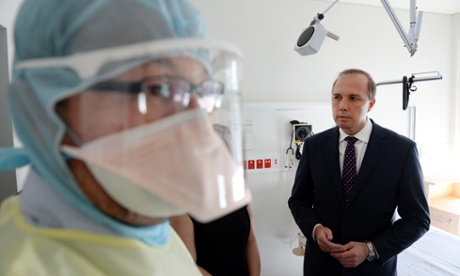Tanya Plibersek says Australia would be in ‘big trouble’ if it waited for virus to spread to Asia Pacific before offering help

Australia would be in “big trouble” if it waited for the Ebola virus to spread to the Asia-Pacific region before acting, the opposition has said, as the government called for bipartisanship on the serious health issue.
The health minister, Peter Dutton, said on Sunday the government continued to talk with other countries about what support could be provided if Australian medical teams were dispatched to west Africa and later needed to be evacuated.
Dutton accused Labor of “playing politics with a very important issue” and indicated that Australia was “ready to rapidly deploy support” if an outbreak occurred in near neighbours such as Papua New Guinea or the Solomon Islands.
“We would have an obligation as a good friend and neighbour in our region to respond if we had a request from one of those nations,” he said.
The opposition’s deputy leader and foreign affairs spokeswoman, Tanya Plibersek, reaffirmed her calls for the government to overcome “impediments” and send health workers to west Africa to help contain the outbreak, which had killed more than 4,500 people.
“The best way that we can protect Australia and protect Australians is to help stop Ebola in west Africa,” she told the ABC’s Insiders program on Sunday.
“The point is if Ebola gets to Asia, if Ebola gets to the borders of Australia, we have lost control of this … We have a very small window of opportunity. Australia should be involved in stopping Ebola in west Africa, getting it under control in the three countries most affected.
“If we are waiting for it to come to our borders, then we are in big trouble.”
The political dispute centres on unequivocal assurances the government is seeking in the event that a member of an Australian-dispatched medical team contracted the virus and needed assistance to be evacuated from the region.
Diplomatic officials said it would take some 30 hours to fly a person back to Australia, so a nearer country would have to receive the patient – but the government required an “iron-clad” guarantee rather than a general offer to help.
Plibersek and Labor’s health spokesman, Catherine King, wrote to the government last week urging it to make immediate arrangements to “deploy Australian Medical Assistance Teams (Ausmat) or similar to west Africa” and “support other specialist Australian personnel (such as doctors and nurses) who are willing and able to assist in preventing the spread of Ebola in west Africa”.
Ausmat are rapid-response health teams that include doctors, nurses, paramedics, firefighters and allied health staff.
Labor’s letter said the government should “negotiate with our international partner countries to ensure appropriate standby and evacuation management arrangements for any Australian personnel”.
In reply, Dutton and the foreign affairs minister, Julie Bishop, wrote that Labor was showing “reckless disregard” for the safety of health workers by ignoring clear advice from foreign affairs, health and defence experts about the lack of credible evacuation arrangements.
“In the absence of such arrangements, the most effective way Australia can make a rapid contribution to international response efforts is through financial support for international organisations and frontline services in affected countries,” Dutton and Bishop said in the letter to their Labor counterparts.
Plibersek said it was “a bit rough” for the ministers to call for bipartisanship when the government was not doing enough to confront Ebola.
She said the UK and US were building hospitals specifically for health workers in west Africa and she was confident the government could find a solution, while acknowledging that “no humanitarian mission like this is without risk”.
Plibersek suggested that the prime minister, Tony Abbott, should speak directly with his UK counterpart, David Cameron, and the US president, Barack Obama, to seek support for Australian medical personnel.
Dutton said the government was “working very hard behind the scenes” and cabinet’s national security committee had met five times to look at ways in which Australia could respond to any potential cases within the Asia-Pacific region.
“As I’ve said consistently and as the opposition has been advised, we are working with our partners who have announced support and a presence within west Africa, including obviously the US and the UK but other European and Asian partners as well, about what arrangements we could put in place if we were minded to send Australian health workers into west Africa,” he said in Brisbane on Sunday.
“Now, we will continue those discussions, but we’re not like Labor where they issue press releases saying workers are going and then we’ll work out the detail afterwards. Good governments work through the detail to make sure that we have guaranteed support in place before we made any announcements about what we might do.”
Dutton suggested there was a difference of opinion between Plibersek and the Labor leader, Bill Shorten, who had repeatedly emphasised the voluntary nature of any Australian medical workers travelling to west Africa.
Plibersek has also previously spoken about supporting people who were “willing and able” to assist.
Dutton said he had talked to the Bill and Melinda Gates Foundation and with the biotechnology and vaccine company CSL “about work that we might be able to partner in and we’ll have something further to say about that in due course”.
“There’s an enormous effort by the federal government and the state governments to make sure that we’re well prepared for any presentations here in Australia,” he said.
The Australian Medical Association (AMA) president, Brian Owler, said last week it was not a time for Australia to “put our heads in the sand” and pretend Ebola was a problem for west Africa alone.
Owler said while the AMA was not suggesting deployment of people who did not want to go to west Africa, the government should resource and properly support volunteers who were willing to “do this dangerous work”.
